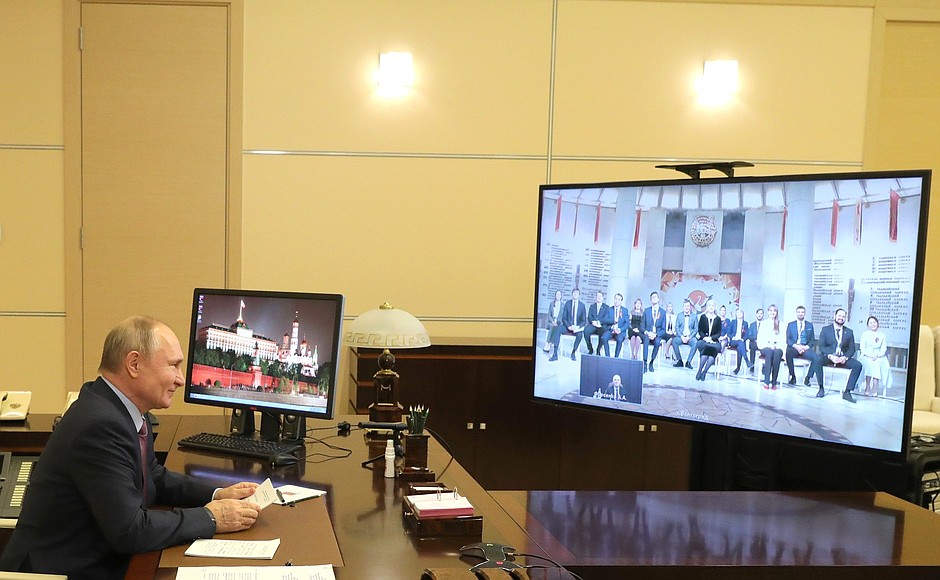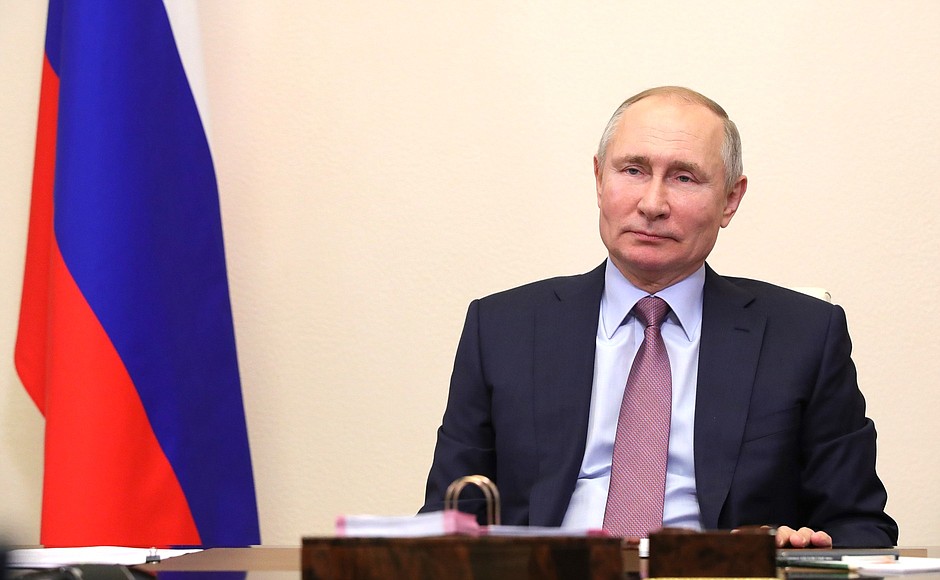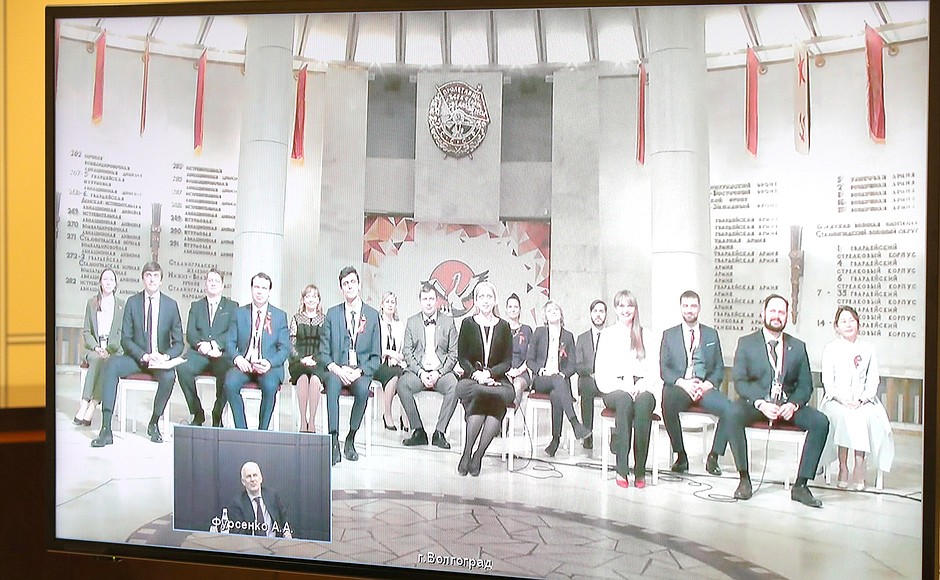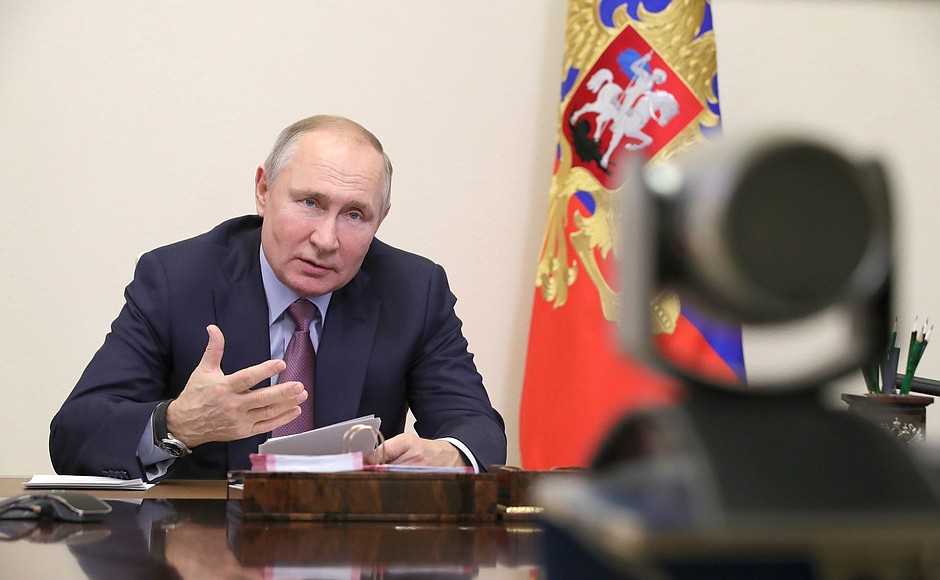President of Russia Vladimir Putin: Good afternoon, friends.
I am delighted to see you all.
First of all, congratulations on winning this wonderful, even legendary contest, Teacher of the Year. This contest was launched in the 1990s. Originally titled USSR Teacher of the Year, it was later renamed Russian Teacher of the Year. Of course, I would like to give a special mention to the grand champion, Mikhail Gurov. Mikhail, raise your hand. Glad to see you.
I know that the competition was fierce and each of you is, without doubt, a worthy contender for such a distinguished title. You have proved it with your work at school with your students; you have successfully completed the difficult stages of the contest and earned the well-deserved acclaim of your colleagues and the teaching community.
I am certain that this recognition will motivate you to soar to new heights, continue your professional development, master new skills and be a role model for your colleagues and students. Innovation, the spirit of leadership and knowing that you are part of one big team are the cornerstones of the education system.
Teaching is noble, creative, demanding and, most definitely, very responsible work that has always been held in great esteem. I can certainly say that it has always been this way in our country. It is school teachers and mentors who can fundamentally affect their students and determine what kind of people they grow up to be. A teacher is able not only to spark interest in knowledge and bring children’s talents and abilities to light but to instil the core values that will be a tower of strength for a person in their adult life. This is the noble mission and the purpose of the teaching profession which, as I said, is simply impossible to disrespect.
Despite the continuous technological progress, technology cannot replace face-to-face interaction (we have noted this many times recently) and communicate the depth and complexity of learning and teaching which are, indeed, a collaboration between a student and a teacher. Mentorship plays the essential and pivotal role in education and upbringing and, I believe, it will do for many years, it always will. This belief was reinforced once again during the remote schooling because of the pandemic.
I would like to use this opportunity and to thank you and all teachers for your work during this difficult period. I realise what an extra load you have assumed. You have tried to do everything you could for your students. Today, I want to say that Russian teachers in major cities, in towns, and in rural schools, have shown their best side. They and their children have accomplished what will serve the country in the years to come.
It appears that not everything was perfect, and the going was not always smooth, but on the whole, our entire country and the national education system are passing the tests in a worthy manner at all levels. I would like to note that the equipment, technology and resources that the schools have received in the past few years have helped the schools work through the pandemic-related difficulties.
Of course, I know that much is still lacking, and we will probably discuss this today. But, believe me, it seemed impossible only a short time ago that all of our nearly 40,000 schools would have access to the internet. But being consistent, we have accomplished a lot.
But again, we have to accomplish even more, especially at this stage. In this context, the state’s goal and its priority remain the same. I want to assure you that we will continue to do everything possible to see that our schools and education system will be truly modern, so that they can access broadband internet, so that every child is able to unlock his or her talent, find his or her way in the world of knowledge, so that he or she finds it interesting to study, and so that teachers feel the support of the state and society.
In this connection, I would like to recall that, in the next three years, we will spend almost 225 billion rubles on supporting the 800,000 classroom teachers who account for 75 percent of all school teachers. When making this decision, we were guided by the tremendous role of teachers in bringing up and developing the younger generation of Russian citizens.
Of course, we will also develop systems and platforms that help educators improve their professionalism, expand their competences and use the best experience and practices. The Teacher of the Year contest aims to merge and popularise these practices. And, we now have the tradition where the city of the previous year’s winner hosts the competition finals.
You are now at the Hall of Triumph of the Battle of Stalingrad Museum-Panorama. Today’s date is symbolic. I believe that all this is very symbolic and important. Regardless of what way of life a person chooses, he or she must know and respect the history of his or her country, value the heroic feats of our predecessors for the sake of the younger generation.
In conclusion, I would like to once again congratulate you on succeeding in this contest. You have achieved this success because you are sincerely dedicated to your work and your calling. I hope that you will continue to do this in the future, as well.
I wish good health and prosperity to you and your families, and I also wish you new successes.
<…>
Vladimir Putin: Colleagues, in conclusion I will say just a few words, proceeding from what Anton Gomozov said, namely, that a film could be made about our outstanding teachers. He said this would enhance the prestige of teachers, of their profession. Of course, we must always think about this and make steps towards this goal, matching our words with deeds.
This is what I would like to draw your attention to. As I said, in 1990–1991, the contest that you have won was called The USSR Teacher of the Year. Since 1992, it has been called The Russian Teacher of the Year. During the course of its entire history, including 1990 and 1991, the contest has been won by seven women and 25 men. Most often, the absolute winners were teachers of the Russian language and literature (nine people), maths (five people) and history, biology and music (three people for each speciality).
Now, in 2020, 85 people are competing in the final stage of the contest. And the number of women has increased: 57 women and 28 men – 85 people in all.
Now, how many of them are in the Hall of Fame? Not 85, but where are the remaining 85? Where are they? We do not see or hear them. I am absolutely convinced that all of them are brilliant specialists, wonderful teachers and educators.
Which specialists have reached the final? Seventeen of them teach history and social sciences; 15 – the Russian language and literature; 13– foreign languages, seven – maths; six – biology; five – physical fitness; four – physics; three – information science, chemistry and geography; and one – technology and one music. The contest was held in three stages: first, second and third. I am simply convinced that there were a lot of interesting episodes at each of these stages and very many interesting people.
Why am I saying this? When I looked through the relevant information before this meeting, I thought that the contest went on for a year and involved so many bright, interesting and beautiful professionals who remain unseen by the country. Many people know about shows such as Fort Boyard, and so on. This does not mean that we should hold the Teacher of the Year contest in a similar format, making all kinds of jumps and leaps all the time, even though five of the winners are physical education teachers.
But if we turn the Teacher of the Year contest into an attractive and brilliant show with good content, you and your colleagues will always be in the focus of public attention. This is indeed very interesting. I have already mentioned the subjects involved: history, literature, geography, biology and mathematics. We could make a separate interesting show for each subject and organise this contest so that people across the country will gladly watch it. And the teaching profession will always be at the forefront of our citizens’ consciousness, at the forefront of the public mind.
I will ask [Education Minister Sergei] Kravtsov to consider this possibility. I will also talk with our colleagues in the media who deal with this kind of content.
Just take a look at the Scarlet Sails festival we have created in St Petersburg for school leavers. It has become one of the world’s best festivals, actually one of a kind, which is why it has won top-tier international awards. But who trained these school leavers? Teachers did. Throughout the year, teachers could tell people about their profession and their spheres of activity, doing this in an attractive and interesting way and even involving their students. This could be a wonderful story which many people in the country would be delighted to watch online or on TV, enjoying what you are doing for your students and how you are doing it
I would like to wish this year’s winners all the best and to thank them for their work. Thank you very much.



